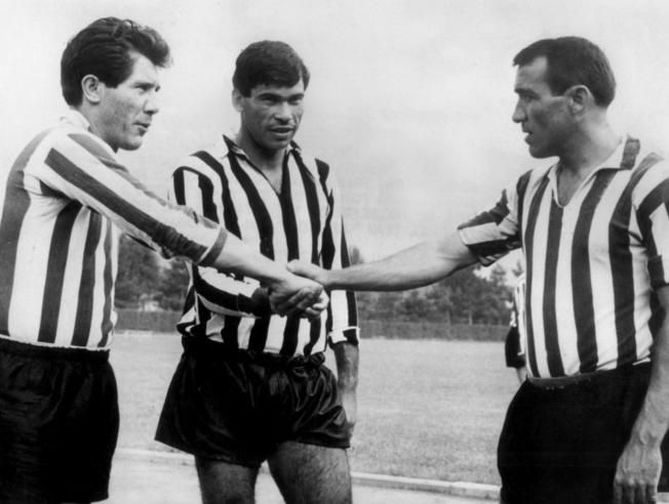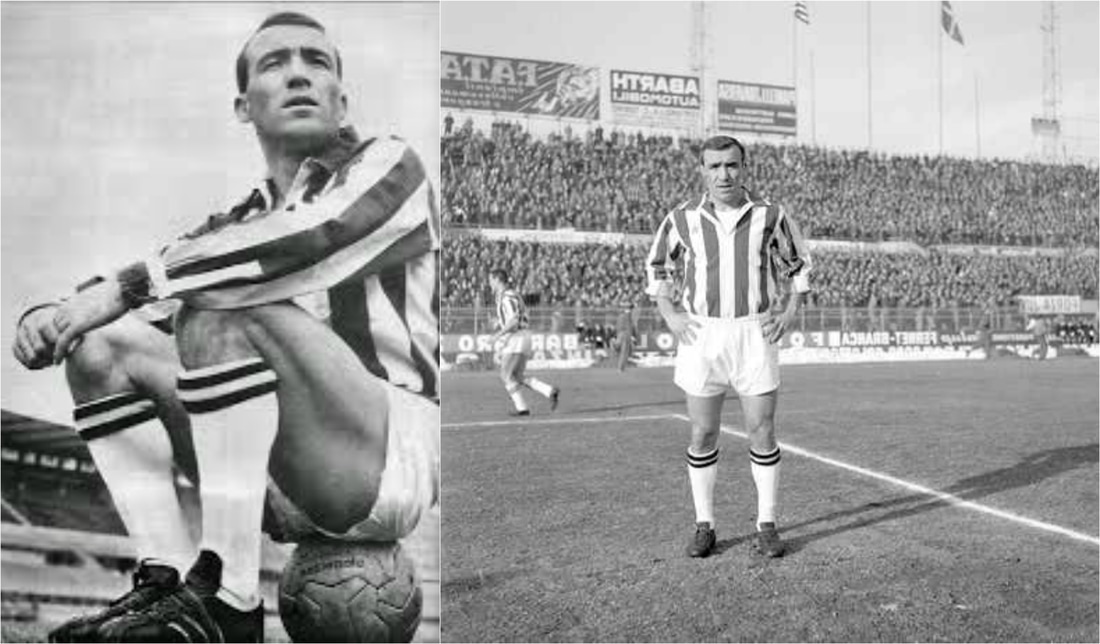In 1983, former professional footballer Luis del Sol took the decision to close his struggling furniture company and put some of his remaining cash towards studying for his coaching badges. The doomed business venture had eaten up most of his savings and he was in danger of being left penniless.
Unfortunately for the Spaniard, his 20 years of glory at the highest level of sport did not provide him with much economic security. Like many players at the time, he was unaware of the need to engage in prudent financial planning and just lived for the moment, not believing that the constant flow of money would ever run dry.
This all-too-familiar tale of financial mismanagement amongst sports players meant that at the age of 48, the man who had once played alongside the likes of Alfredo Di Stéfano, Ferenc Puskas, Francisco Gento and Omar Sívori, and had been sold to Juventus for more than three hundred million lire in 1962, found himself starting from scratch.
Born near Soria, in the Castile and León region of Spain, Del Sol’s family roots can be traced back to Vercelli in Italy, and it was there in his ancestral homeland that he would spend much of his professional career – but not before leaving an indelible mark on football in his country of birth.
Luis del Sol’s father worked as a machinist for the MZA railway company and as a result, the family moved to Seville when Luis was just two months old. Tragically, his father died soon after and his mother was left to raise Luis and his seven siblings on her own.
When Luis reached the age of 14, he began working for a local aviation company (Subsidiaria de Aviación) and got his first exposure to competitive football playing for the factory team. By the age of 16, he had joined the youth ranks of Real Betis and just two years later, he was turning out for their first team, becoming a crucial part of the squad that achieved promotion to the second division in 1954. Four years later, Del Sol played an instrumental role in the Béticos’ long-awaited return to the top flight. During his time in Seville, his relentless speed and stamina earned him the nickname ‘Seven Lungs.’
His consistent performances soon attracted the interest of other clubs and it seemed only a matter of time before he would leave his adopted home town. Sure enough, after seven seasons playing for the Verdiblancos, Luis del Sol was transferred to La Liga giants Real Madrid for 6,500,000 pesetas. He found out he had been sold when the wife of President Benito Villamarín expressed her condolences during a casual chat.
The 25-year-old went on to make a total of 96 official appearances for Los Blancos, scoring 32 goals in the process. He also helped them win a European Cup, two La Liga titles, a Spanish Cup and an Intercontinental Cup. His ability to deliver the perfect pass also bagged him a new nickname, as teammate Di Stéfano dubbed him ‘The Postman.’ This time, his sobriquet would stick with him for the rest of his career.
On August 2, 1962, it was revealed that Juventus had been in talks with Real Madrid for the player’s signature. A provisional deal had been agreed that included a fee in excess of 300 million lire, and an accord that the clubs would play up to three friendly matches the following year. The Juventus President Vittore Catella also revealed that the club were planning to sign Brazilian World Cup winner Amarildo from Botafogo the following year. However, as part of the negotiations, it was suggested that Real Madrid could have permission to sign the player with the option of doing a cash-plus-player swap involving Del Sol the following summer. Despite the complexity of the negotiations, a deal was eventually agreed.
Certain sections of the Italian Press were sceptical about Catella’s decision to spend a record-breaking amount of money on a 27-year-old who was surely entering the autumn of his career. Talk of an alleged buy-back clause involving Amarildo was seen as a token attempt to quell any such concerns. And as it turned out, neither Real Madrid nor Juventus signed the Brazilian, with the player eventually moving to AC Milan.
Luis del Sol was the first Spaniard to turn out for the Turin club and made an instant impact, impressing with his dynamic style of play and famed athleticism. Having spent much of his time on the wing at Madrid, he was now deployed in a more central role where his technical ability and physical toughness could be best deployed. He made his league debut on September 16, 1962 against Genoa, and by the end of the season, had lifted his first trophy with the club, scoring a penalty in the 3-2 Coppa delle Alpi final victory against Atalanta.
Some observers were concerned as to how the new arrival would integrate alongside Bianconeri forward Omar Sívori. After all, the pair had previously engaged in a violent scuffle in the quarter-finals of the European Cup at the Parc des Princes just a few months earlier. As it turned out, the new teammates immediately buried the hatchet and went on to develop a close relationship on and off the field.
 Omar Sívori (left), Nestor Combin and Luis del Sol (right), 1964/65
Omar Sívori (left), Nestor Combin and Luis del Sol (right), 1964/65
Del Sol soon developed a reputation for his professionalism and strong work ethic on the field of play; but behind the scenes, he was also famed for his love of hearty food and cigarettes. Yet despite his off-the-field vices, he could outrun anyone in the team. What’s more, he was a fearless competitor, who was not afraid to challenge even the toughest of opponents to a physical duel, which they nearly always declined.
The Sevillian remained in Turin for eight memorable seasons, winning the Coppa Italia in 1964/65 and the league title in the 1966/67. Such was his impact at the club that in 2011, he was honored with a commemorative star at Juventus Stadium’s Cammino delle stelle (Walk of Fame), an award bestowed on the 50 most important players in the history of the club as voted for by the fans. The only Spaniard on the list, his name now sits proudly alongside the likes of Zoff, Baggio, Zidane, Scirea and Del Piero.
On September 2, 1970, the Turin-based newspaper La Stampa carried the headline: “Luis as an opponent (it seems impossible).” Juventus had just sold Del Sol to Roma and had faced their rivals in a friendly clash the day before. In the same match, former Roma player Fabio Capello (who had moved in the opposite direction), featured in the colours of the Vecchia Signora for the very first time. There was an awkward moment at the start of the match when both players greeted and shook the hands of their ex-teammates before taking their places at opposite ends of the field.
Del Sol spent two years in Rome and went on to captain the club just as fellow Spaniard Joaquín Peiró had done before him. He led the club to victory in the first and only edition of the Trofeo Nazionale di Lega Armando Picchi, beating Inter 1-0 in the final, but other major honours eluded him in the Italian capital.
In 1972, he returned to Real Betis and played out the last days of his career on familiar ground. He is held in such regard at the club that their training complex has since been renamed in his honour.
On the international scene, Luis del Sol made 16 appearances for the Spanish national team and played a part in their successful European Championships campaign of 1964. He also featured in two World Cups but never really established himself as a regular for ‘La Roja’.
After his failed foray into the furniture business, he successfully completed his coaching badges and finally returned to the game he loved – albeit at the bottom of the coaching ladder. In 1983, Spanish newspaper El Pais described his return to the game as: “like having to learn to drive a Seat 127, having driven luxury sports cars on the Italian freeways.”
His coaching trajectory led him from the grass roots of Carmona to the Real Betis Youth team via a spell at Jerez Industrial. He eventually took over the Betis first team during the 1987/88 season, following the dismissal of Luis Cid Carriega, before taking the role of Technical Secretary at the end of the same term. He returned to the bench once again at the end of the 2000/01 campaign, leading the club back to the top flight.
Despite his love for Real Betis, the player (now in his eighties) remains a keen follower of Juventus. During the club’s spell in Serie B, he found it hard to follow their results from his home in Seville and would make weekly phone calls to his old teammates in Italy to keep up to date with their progress.
Those in Turin who had the pleasure of watching Luis del Sol play, often refer to the game against Internazionale at Stadio Comunale on December 22, 1963 as the masterpiece of his career. That Inter team were coached by the cult figure of Helenio Herrera and widely considered one of the finest in Europe; they were reigning Serie A champions and would go on to lift back-to-back European cups over the next two seasons.
Yet, despite taking the lead after four minutes, the Nerazzurri – or Grande Inter as they were known – were humbled 4-1 that day, with Del Sol pulling the strings on a frozen pitch. As well as dictating the play and scoring two goals in a devastating two-minute spell just before halftime, the ‘Postman’ also delivered what would be the perfect snapshot of his 10-year career on the peninsula.

